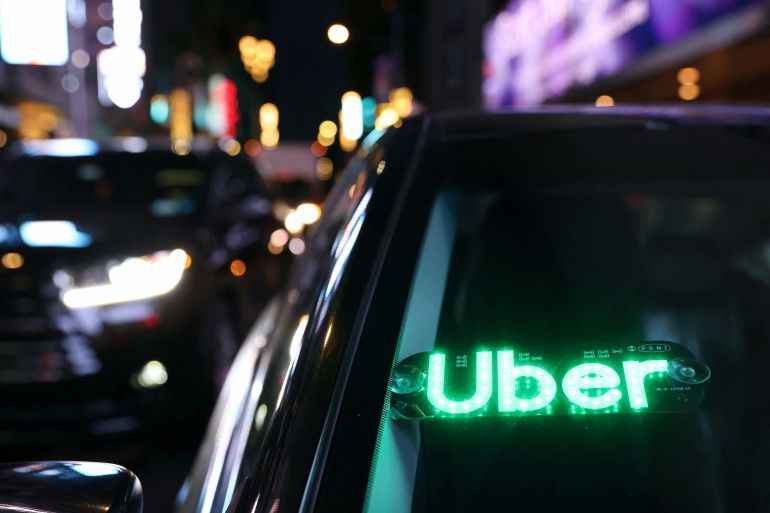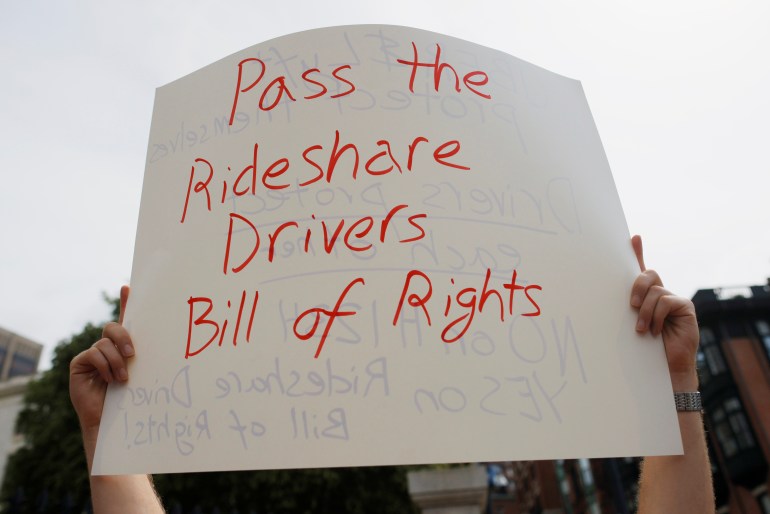Biden labour proposal could shake up gig economy
The proposal would require that US workers who are ‘economically dependent’ on a company be considered its employees and hence entitled to more benefits and protections.

The US Department of Labor has proposed a rule that would make it more difficult for companies to treat workers as independent contractors, a change that is expected to shake up ride-hailing, delivery and other industries that rely on gig workers.
Gig company stocks were hammered on the news, with Uber, Lyft and DoorDash all falling at least 10 percent.
Keep reading
list of 4 itemsPrivate hire drivers should not be forced to work in fear
How Indians consume, drives the business of rubbish
Cost of living: ‘Blood, sweat’ for a Seoul food delivery driver
The proposal, revealed on Tuesday, would require that workers be considered a company’s employees, entitled to more benefits and legal protections than contractors, when they are “economically dependent” on the company. It could have wide-ranging impacts on company profits and hiring, and household incomes and worker quality of life.
The Labor Department could restrict independent contracting and said it will consider workers’ opportunities for profit or loss, the permanency of their jobs, and the degree of control a company exercises over a worker, among other factors.
The final rule is expected next year.
Most federal and state labour laws, such as those requiring a minimum wage and overtime pay, only apply to a company’s employees. Employees can cost companies up to 30 percent more than independent contractors, studies suggest.
Millions of Americans are working “gig” jobs and this labour has become vital to some transportation, restaurant, construction, healthcare and other business models.
United States Labor Secretary Marty Walsh in a statement said businesses often misclassify vulnerable workers as independent contractors.
“Misclassification deprives workers of their federal labour protections, including their right to be paid their full, legally earned wages,” Walsh said.
The rule is the latest move in a politically charged battle that has pitched Republicans and companies against Democrats and worker groups. It would replace a regulation from the administration of former US President Donald Trump that says workers who own their own businesses or have the ability to work for competing companies, such as a driver who works for Uber and Lyft, can be treated as contractors.
Solicitor of Labor Seema Nanda, the department’s top legal official, said on Tuesday that the Trump-era rule, which was favoured by business groups, was out of step with decades of federal court decisions.
The new proposal mirrors legal guidance issued by the administration of President Barack Obama, which was withdrawn by the Labor Department under Trump.
More than one-third of US workers, or nearly 60 million people, performed some sort of freelance work in the past 12 months, a December 2021 survey by freelancing marketplace Upwork showed.

Groups representing businesses including the US Chamber of Commerce, which is the largest US business lobbying group, the National Association of Home Builders, the National Retail Federation and Associated Builders and Contractors had met with White House officials to lobby for a more business-friendly standard.
Those groups have said that any broad rule would hurt workers who want to remain independent and have flexibility.
Worker advocacy groups have said that companies are increasingly misclassifying employees as independent contractors, depriving workers of fair pay and benefits to pad their profits. Most worker benefits in the US – including health insurance, sick pay, workers’ compensation and unemployment insurance – are attached to an employment relationship.
‘A clear blow’
Wedbush analyst Dan Ives said in a research note that the proposal is “a clear blow to the gig economy and a near-term concern for the likes of Uber and Lyft”.
“With ride-sharing and other gig economy players depending on the contractor business model, a classification to employees would essentially throw the business model upside down and cause some major structural changes if this holds,” Ives said.
But both Uber and Lyft dismissed the potential impact of the new rule, saying that they could thrive in either scenario.
“Today’s proposed rule takes a measured approach, essentially returning us to the Obama era, during which our industry grew exponentially” CR Wooters, head of federal affairs at Uber, said in a statement.
In a blog post, Lyft said the company had expected this change since the start of the administration of current President Joe Biden. “Importantly this rule: Does not reclassify Lyft drivers as employees. Does not force Lyft to change our business model,” the company said.
Gig economy giants have weathered past attempts in the US to require their workers to be classified as employees.
In 2020, California voters overwhelmingly approved a proposition to exempt drivers for app-based companies from a state law requiring them to be designated as employees. Uber, Lyft and other companies had spent $200m campaigning in favour of the proposition. However, a judge struck down the ballot measure as unconstitutional last year, setting up a legal fight that could end up in the California Supreme Court.
The Biden administration’s proposal will be formally published on Thursday, kicking off a 45-day public comment period.